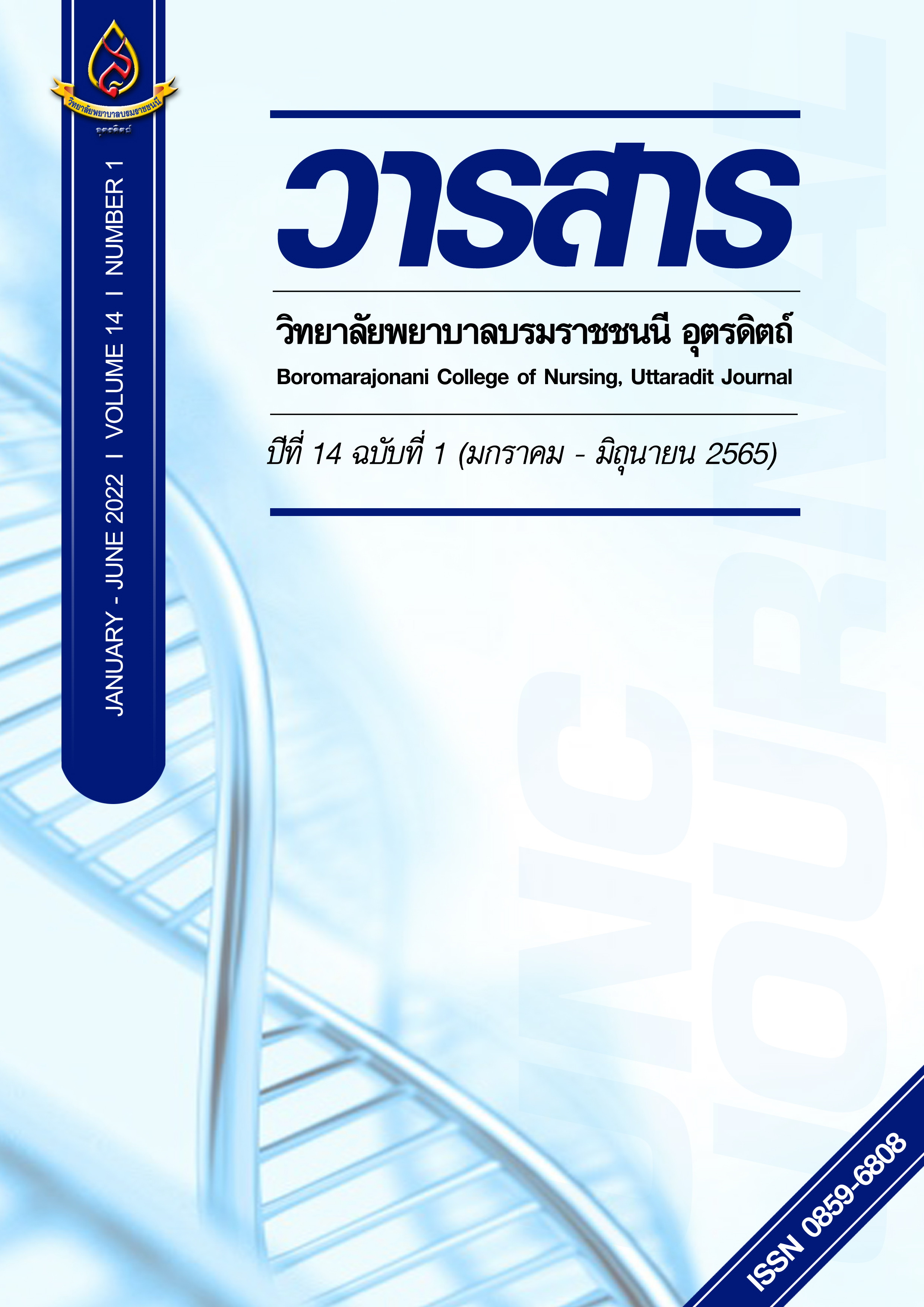การพัฒนาแนวทางการสนับสนุนการจัดการสุขภาพตนเอง ของผู้สูงอายุที่เป็นโรคเบาหวานชนิดที่ 2 ในชุมชน
Main Article Content
บทคัดย่อ
การวิจัยและพัฒนานี้มีวัตถุประสงค์เพื่อพัฒนาและประเมินผลแนวทางการสนับสนุนการจัดการสุขภาพตนเองของผู้สูงอายุที่เป็นโรคเบาหวานชนิดที่ 2 มี 3 ระยะ คือ ระยะที่ 1) ศึกษาสถานการณ์ภาวะสุขภาพ กลุ่มตัวอย่าง คือ ผู้สูงอายุที่เป็นโรคเบาหวานชนิดที่ 2 จำนวน 194 คน และผู้ให้ข้อมูล คือ ผู้สูงอายุที่เป็นโรคเบาหวานชนิดที่ 2 จำนวน 6 คน ระยะที่ 2) พัฒนาแนวทางการสนับสนุนการจัดการสุขภาพตนเองฯ ผู้ให้ข้อมูล คือ บุคลากรสาธารณสุข องค์กรปกครองส่วนท้องถิ่น ผู้นำชุมชน และผู้สูงอายุที่เป็นโรคเบาหวานชนิดที่ 2 จำนวน 8 คน และ ระยะที่ 3) ประเมินผลแนวทางการสนับสนุนการจัดการสุขภาพตนเองฯ กลุ่มตัวอย่าง คือ ผู้สูงอายุที่เป็นโรคเบาหวานชนิดที่ 2 จำนวน 30 คน และกลุ่มพี่เลี้ยงอาสาสมัครสาธารณสุข (อสม.) จำนวน 10 คน เครื่องมือที่ใช้ในการเก็บข้อมูล คือ แบบสอบถาม แนวคำถามสำหรับการสัมภาษณ์เชิงลึกและการสนทนากลุ่ม วิเคราะห์ข้อมูลเชิงปริมาณโดยสถิติเชิงพรรณนาและสถิติที วิเคราะห์ข้อมูลเชิงคุณภาพโดยการวิเคราะห์เชิงเนื้อหา
ผลการวิจัย พบว่า ระยะที่ 1 ผู้สูงอายุที่เป็นโรคเบาหวานชนิดที่ 2 มีพฤติกรรมการจัดการสุขภาพตนเอง 5 ด้าน ดังนี้ ด้านสุขภาพจิต/การจัดการความเครียดอยู่ในระดับสูง ร้อยละ 63.1 ด้านการออกกำลังกาย/การเคลื่อนไหวออกแรง ด้านการใช้บริการสุขภาพและด้านความรับผิดขอบต่อสุขภาพอยู่ในระดับปานกลาง ร้อยละ 61.5, 71.5 และ 43.6 ตามลำดับ และด้านการบริโภคอาหารอยู่ในระดับต่ำ ร้อยละ 77.7 ระยะที่ 2 แนวทางการสนับสนุนการจัดการสุขภาพตนเองฯ มี 2 ส่วน ได้แก่ สนับสนุนการจัดการตนเองโดย อสม. และพัฒนาทักษะการจัดการตนเอง ระยะที่ 3 การประเมินแนวทางการสนับสนุนการจัดการสุขภาพตนเองฯ พบว่า กลุ่มทดลองมีคะแนนเฉลี่ยพฤติกรรมการจัดการสุขภาพตนเองโดยรวมสูงกว่าก่อนการทดลองอย่างมีนัยสำคัญทางสถิติที่ระดับ 0.05
Article Details

อนุญาตภายใต้เงื่อนไข Creative Commons Attribution-NonCommercial-NoDerivatives 4.0 International License.
บทความหรือข้อคิดเห็นใดใดที่ปรากฏในวารสารวิจัยการพยาบาลและวิทยาศาสตร์สุขภาพ เป็นวรรณกรรมของผู้เขียน ซึ่งบรรณาธิการหรือสมาคมศิษย์เก่า ไม่จำเป็นต้องเห็นด้วย และบทความที่ได้รับการตีพิมพ์เผยแพร่ถือเป็นลิขสิทธิ์ของวารสารวิจัยการพยาบาลและวิทยาศาสตร์สุขภาพ
เอกสารอ้างอิง
Best, J., W, & Kahn, J., V. (2006). Research in education (A. Burvikovs, E & K. Hopkins, Eds. 10th ed.). Pearson Education Inc.
Bodenheimer, T., Wagner, E.H., & Grumbach, K. (2002). Improving primary care for patient with chronic illness. The Journal of the American Medical Association, 288(14), 1775-1779.
Coleman, K., Austin, B.T., Brach, C., & Wagner, E.H. (2009). Evidence on the chronic care model in the New Millennium. Health Affairs, 28(1), 75-85.
Jiamjarasrangsi, W. (2013). Self-management support interventions for type 2 diabetic patients. Chula Journal of Internal Medicine, 57(3), 279-291. (in Thai).
Knowles, M. S. (1984). Self-directed learning: A neglected species. (3rd ed). Houston: Gulf Publishing Co.
Lorig, K.R., & Holman, H.R. (2003). Self-management education: History, definition, outcome, and mechanism. Annals of Behavioral Medicine, 26(1), 1-7.
Ministry of Public Health. (2020). Health KPI. Retrieved (2021, March 25). from http://healthkpi.moph.go.th/kpi2/kpi/index2/. (in Thai).
Phitsanulok Provincial Public Health Office. (2017). Health data center. Retrieved (2021, May 12). from https://hdcservice.moph.go.th/hdc/main/index.php. (in Thai).
Qi, X., Xu, J., Chen, G., Liu, H., Liu, J., Wang, J., Zhang, X., Hao, Y., Wu, Q., & Jiao, M. (2021). Self-management behavior and fasting plasma glucose control in patients with type 2 diabetes mellitus over 60 years old: multiple effects of social support on quality of life. Health and Quality of Life Outcomes, 19(1).
https://doi.org/10.1186/s12955-021-01881-y
Rosenstock, I. M., Strecher, V. J., & Becker, M. H. (1988). Social Learning Theory and the Health Belief Model. Health Education & Behavior, 15(2), 175–183. https://doi.org/10.1177/109019818801500203
Sittipreechachan, P., Pichayapinyo, P., Lagampan, S., & Chongsuwat, R. (2022). A community health volunteer involvement program for glycated hemoglobin reduction among Thai patients with uncontrolled type 2 diabetes: a mixed-method study. Journal of Primary Care and Community Health, 13.
https://doi.org/10.1177/21501319221077960
Srivanichakorn, S. (2011). How to adjust and reform the system to be relevant to chronic diseases. The Journal of Primary Care and Family Medicine, 2(6), 4-6. (in Thai).
Thai Health Committees. (2011). Community capabilities. Retrieved (2021, March 25). from https://bit.ly/3uSa6pT. (in Thai).
Thananchai, P., & Wangwonsin, A. (2020). Effects of self-management program on health behaviors and blood pressure among prehypertension group, Pak Huaioi health promoting hospital, Phrae province. Boromarajonani College of Nursing, Uttaradit Journal. 12(2), 83-99. (in Thai).
Tsai, A.C., Morton, S.C., Mangione, C.M., & Keeler, E.B. (2005). A Meta-analysis of Interventions to Improve Care for Chronic Illnesses. American Journal of Managed Care, 11(8), 478- 488.
Wagner, E.H., Austin, B.T., Davis, C., Hinmarsh, M., Schaefer, J., & Bonomi, A. (2001). Improving chronic illness care: translating evidence into action, Health Affairs. 20(6), 64-78.
Wangwonsin, A. (2014). Developing an instrument to assess caring in type 2 diabetes mellitus by using chronic care model: a perspective of provider and client. (Dissertation). Naresuan University. (in Thai).
Wangwonsin, A., Jariya, W., & Phetphum C. (2020). Perceived quality of health care by health care system level among type 2 diabetic patients in Northern Thailand. Southeast Asian Journal of Tropical Medicine and Public Health, 51(3), 406-412.
Wangwonsin, A., Kitreerawutiwong, N., Tejativaddhana, P., & Lasuka, D. (2014). A Consensus-based definition on chronic care model of type 2 diabetic patients among Thai experts using nominal group technique. The Public Health Journal of Burapha University, 9(1), 36-50. (in Thai).
Wisutwet, W. (2009). Chronic diseases among elders lighted by the Ministry of Public Health. Retrieved (2021, March 25). from http://www.thaihealth.or.th/Content/12357. (in Thai).
Wongngern, N., & Wangwonsin, A. (2019) Effects of self-Management support program on self- management behavior among uncontrolled type 2 diabetes mellitus patients. EAU Heritage Journal Science and Technology, 13(2), 267-280. (in Thai).
World Health Organization (2016). Diabetes 2016 Thailand country profiles. Retrieved (2021, March 25). from https://www.who.int/publications/m/item/diabetes-tha-country-profile-thailand-2016.
World Health Organization (2017). Fact sheet: diabetes mellitus November 2017. 2017.
Retrieved (2021, March 25). from http://www.who.int/mediacentre/factsheets/fs312/en/


